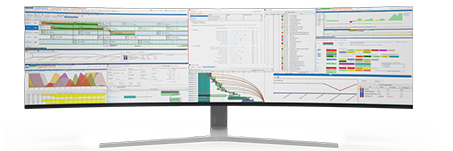Global Quality Management for Logistics
Managing global supply chains in chemical manufacturing facilities requires a comprehensive approach to quality management. As a Supply Chain Manager, you understand the critical role logistics plays in ensuring product quality, customer satisfaction, and regulatory compliance.
In this blog, we will explore the challenges of global quality management for logistics and how integrating advanced planning and scheduling software like PlanetTogether with leading ERP systems such as SAP, Oracle, Microsoft, Kinaxis, or Aveva can streamline operations and enhance overall supply chain performance.

Managing Logistics on a Global Scale
Chemical manufacturing involves complex processes and stringent quality standards. Ensuring the timely delivery of high-quality products to customers across the globe requires effective coordination of logistics activities, including transportation, warehousing, and distribution.
However, managing logistics on a global scale presents several challenges:
Supply Chain Complexity: Global supply chains involve multiple stakeholders, including suppliers, manufacturers, distributors, and customers, operating across diverse geographical locations. Coordinating these complex networks while maintaining quality standards can be daunting.
Regulatory Compliance: Chemical manufacturers must adhere to a myriad of regulations and standards imposed by various governmental bodies and industry organizations. Failure to comply can result in severe penalties, product recalls, and damage to reputation.
Demand Volatility: Fluctuations in demand, market trends, and unforeseen events such as natural disasters or geopolitical tensions can disrupt supply chain operations, leading to delays and inefficiencies.
Data Silos: Siloed information across different systems and departments can hinder visibility and collaboration, making it challenging to make informed decisions and respond promptly to changing conditions.


Integrating PlanetTogether with leading ERP systems
To address these challenges, chemical manufacturers are increasingly turning to integrated solutions that connect different aspects of their supply chain operations. By integrating advanced planning and scheduling software like PlanetTogether with leading ERP systems, companies can achieve greater visibility, efficiency, and control over their logistics processes.
SAP Integration: SAP offers comprehensive ERP solutions tailored to the needs of chemical manufacturers. By integrating PlanetTogether with SAP's logistics modules, companies can synchronize production schedules with demand forecasts, optimize inventory levels, and ensure timely delivery of products while maintaining quality standards.
Oracle Integration: Oracle's ERP system provides robust capabilities for managing supply chain operations. By integrating PlanetTogether with Oracle, chemical manufacturers can leverage real-time data to optimize transportation routes, minimize lead times, and proactively address quality issues throughout the logistics process.
Microsoft Integration: With its Dynamics 365 suite, Microsoft offers a versatile platform for integrating planning and scheduling with ERP functionalities. By combining PlanetTogether with Microsoft Dynamics, companies can achieve seamless coordination between production and logistics, enabling them to meet customer demands efficiently while upholding quality standards.
Kinaxis Integration: Kinaxis specializes in supply chain planning and orchestration solutions. By integrating PlanetTogether with Kinaxis RapidResponse, chemical manufacturers can gain end-to-end visibility into their supply chain, enabling proactive risk management, scenario planning, and rapid response to quality issues.
Aveva Integration: Aveva provides software solutions specifically designed for the process industries, including chemicals. By integrating PlanetTogether with Aveva's ERP system, companies can optimize production scheduling based on real-time data, streamline material flow, and ensure compliance with quality standards throughout the supply chain.

Benefits of Integration
The integration of advanced planning and scheduling software with leading ERP systems offers several benefits for chemical manufacturers:
Enhanced Visibility: By consolidating data from multiple sources into a centralized platform, integration provides real-time visibility into supply chain operations, enabling better decision-making and proactive risk management.
Improved Efficiency: Integration streamlines workflows, automates repetitive tasks, and optimizes resource utilization, leading to improved efficiency and productivity across the logistics process.
Better Quality Control: By connecting production schedules with quality management systems, integration enables proactive identification and resolution of quality issues, ensuring that only products meeting the highest standards are delivered to customers.
Greater Agility: Integration facilitates rapid response to changing market conditions, demand fluctuations, and supply chain disruptions, enabling companies to adapt quickly and maintain a competitive edge.
Cost Savings: By reducing lead times, minimizing inventory levels, and optimizing transportation routes, integration helps lower operational costs and improve overall profitability.
Mastering global quality management for logistics is essential for chemical manufacturers to ensure customer satisfaction, regulatory compliance, and operational excellence. By integrating advanced planning and scheduling software like PlanetTogether with leading ERP systems, companies can overcome the challenges of managing global supply chains and achieve greater visibility, efficiency, and control over their logistics processes.
As a Supply Chain Manager, embracing integration is key to unlocking the full potential of your supply chain and staying ahead in today's competitive market. Are you ready to take your manufacturing operations to the next level? Contact us today to learn more about how PlanetTogether can help you achieve your goals and drive success in your industry.